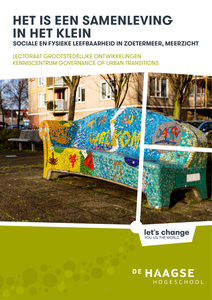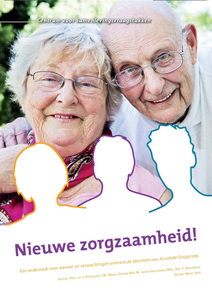BACKGROUND: Patients are increasingly expected to take an active role in their own care. Participation in nursing documentation can support patients to take this active role since it provides opportunities to express care needs and preferences. Yet, patient participation in electronic nursing documentation is not self-evident.OBJECTIVE: To explore how home-care patients perceive their participation in electronic nursing documentation.METHODS: Semi-structured interviews were conducted with 21 home-care patients. Interview transcripts were analysed in an iterative process based on the principles of reflexive inductive thematic analysis.RESULTS: We identified a typology with four patient types: 'high need, high ability', 'high need, low ability', 'low need, high ability' and 'low need, low ability'. Several patients felt a need for participation because of their personal interest in health information. Others did not feel such a need since they trusted nurses to document the information that is important. Patients' ability to participate increased when they could read the documentation and when nurses helped them by talking about the documentation. Barriers to patients' ability to participate were having no electronic devices or lacking digital skills, a lack of support from nurses and the poor usability of electronic patient portals.CONCLUSION: Patient participation in electronic nursing documentation varies between patients since home-care patients differ in their need and ability to participate. Nurses should tailor their encouragement of patient participation to individual patients' needs and abilities. Furthermore, they should be aware of their own role and help patients to participate in the documentation.PATIENT OR PUBLIC CONTRIBUTION: Home-care patients were involved in the interviews.
DOCUMENT
Begin 2020 heeft de gemeente Den Haag aan De Haagse Hogeschool (Lectoraat Urban Ageing) gevraagd om samen met Hulsebosch Advies en AFEdemy een integrale monitor te ontwikkelen en uit te voeren waarbij, door middel van kwalitatieve en kwantitatieve methoden, onderzoek wordt gedaan naar de stand van zaken van Den Haag als seniorvriendelijke stad en tevens te kijken naar huidige trends aangaande ouderen. Tevens vroeg de gemeente om de ontwikkeling van een meetinstrument dat in de toekomst eenvoudig bij herhaling kan worden ingezet voor onderzoek: de standaard Age Friendly Cities and Communities Questionnaire (AFCCQ) voor ouderen1. In een stadsenquête en in zogenaamde stadsateliers zijn ouderen gevraagd naar hun bevindingen. In totaal hebben 393 Haagse ouderen meegedaan aan de enquête en 50 aan de stadsateliers. De aan de ouderen gestelde vragen gingen over de volgende acht onderwerpen die volgens de Wereldgezondheidsorganisatie (WHO) gezamenlijk de seniorvriendelijkheid van een stad bepalen: ●Huisvesting; ●Sociale participatie; ●Respect en sociale inclusie; ●Burgerschap en werkgelegenheid; ●Communicatie en informatie; ●Sociale en gezondheidsvoorzieningen; ●Buitenruimte en gebouwen; ●Transport; ● en aanvullend, een negende domein: Financiën. CC-BY NC ND https://www.dehaagsehogeschool.nl/onderzoek/lectoraten/details/urban-ageing#over-het-lectoraat
MULTIFILE

In Rotterdam hebben ze al enige tijd ervaring met verplicht vrijwilligerswerk door langdurige bijstandsgerechtigden. De Wmo-werkplaats Rotterdam deed er onderzoek naar en signaleerde zowel individuele successen als maatschappelijke bezwaren.
LINK
De VVT staat onder druk. Dit komt onder andere door tekorten aan verpleegkundigen als gevolg van een grote uitstroom en een te beperkte instroom. Zorgvisie (2020) geeft aan dat het leerklimaat binnen een instelling van invloed is op instroom en personeelsbehoud, maar in de sector is veel onduidelijkheid over hoe je een goed leerklimaat kunt realiseren. Om de problematiek rondom uit en instroom aan te gaan, is enkele jaren geleden in de regio Haaglanden de brancheorganisatie Zorgscala, bestaande uit dertien VVT-organisaties, opgericht. In opdracht van Zorgscala hebben tien studenten van de opleiding Verpleegkunde aan De Haagse Hogeschool onderzocht hoe het gesteld is met het huidige leerklimaat in de VVT.
MULTIFILE

In dit onderzoeksrapport wordt antwoord gegeven op de vraag “In hoeverre is het wenselijk dat jonge mantelzorgers zorgen voor naaste familieleden?”. Om deze vraag te beantwoorden is allereerst een literatuurstudie verricht naar de beschikbare gegevens over de situatie van jonge mantelzorgers en thema’s die spelen. Vervolgens zijn diepte-interviews afgenomen bij jonge mantelzorgers aan de hand van een vragenlijst met verdiepende thema’s verkregen uit de literatuurstudie. In de interviews is op zoek gegaan naar unieke verhalen over bijzondere situaties achter de voordeur, naar details op microniveau die vanuit de bestudeerde literatuur nog niet bekend zijn. Voor dit kwalitatieve onderzoek is gekozen vanuit de visie en het inzicht dat afstemming in de zorgtriade tussen zorgvrager, jonge mantelzorger en beroepskracht vraagt om gedetailleerde informatie over hoe de jonge mantelzorger de situatie ervaart en beleeft. Naast negatieve gevolgen zoals overbelasting, gezondheidsklachten, isolement, studievertraging of psychische problemen, zijn er ook positieve kanten aan het langdurig zorgen voor een zieke naaste. Zo leert de jonge mantelzorger verantwoordelijkheid te nemen, zelfstandig te handelen, doortastend te zijn en liefdevol te zorgen voor anderen. Kwaliteiten die hen in de ouderrol of als professional goed van pas zullen komen, mits zij hier niet in doorslaan. Opvallend is dat de geïnterviewde jonge mantelzorgers de zorgsituatie waarin zij zitten niet loslaten, hoe moeilijk deze soms ook voor hen is. De zorg voor de naaste gaat altijd voor, andere dingen in het dagelijks leven zoals school, vrienden en sport zijn hier ondergeschikt aan. Aandacht en steun van familie, vrienden en professionals voor hun zorgsituatie vragen zij nauwelijks. Maar helpen wel degelijk om een passende balans te vinden tussen zorgtaken, studie en persoonlijke ontwikkeling. De in dit rapport opgenomen unieke profielen van Aisha, Nadzine, Karin, Ricardo, Siham en Kimberley dragen hier mogelijk aan bij.
DOCUMENT

De term ‘Best persons’ wordt in deze les gebruikt voor: bijzonder slagvaardige mensen die problemen in achterstandswijken helpen aanpakken. Niet alleen professionals, maar ook vrijwilligers kunnen een best person zijn. Het zijn duidelijk geen doorsnee personen, maar personen die door hun omgeving worden opgemerkt als mensen die ‘het verschil maken’. In deze les worden in totaal 5 verbindingen uitgewerkt, oftewel manier om de beweging van onderop en de beweging aan de top met elkaar te verbinden: • best persons • verhalen • verandermethodieken • teamleren • People Analytics In deze openbare les zet de lector zijn visie en die van zijn kenniskringleden uiteen op het organiseren van verandering in het publieke domein. In zijn woorden: Hoe kijken wij daarnaar en wat gaan we komende jaren doen op de snijvlakken tussen onderwijs, onderzoek en beroepspraktijk? Om te beginnen gaan we in op de alsmaar toenemende snelheid in onze maatschappij. We staan daarmee stil bij de maatschappelijke acceleratie die plaatsvindt en wat dit betekent voor het publiek domein (hoofdstuk 2). In het derde hoofdstuk introduceren we ons onderzoeksmodel, dat we in de twee daarop volgende hoofdstukken uitwerken. In hoofdstuk 6 formuleren we ons programma voor onderzoek en onderwijs en in het laatste hoofdstuk gaan we in op de impact die we met dit lectoraat voor publieke professionals willen genereren.
DOCUMENT

In dit rapport stelden we de vraag wat de gevolgen zijn van vermaatschappelijking van de zorg voor de informele zorg en de (mogelijke) rol van woonzorg- en woonservicezones hierin. Hierbij gingen we uit van vermaatschappelijking in brede zin waarbij de integratie van de cliënt in de samenleving centraal stond. Ook is gekeken naar welke andere praktijken - naast woonzorg- en woonservicezones - aansluiten bij vermaatschappelijking van de zorg en wat de gevolgen van deze ontwikkelingen zijn voor de competenties van de sociaal-agoog.
DOCUMENT

Om te zien hoe sociale samenhang vandaag vorm krijgt, hebben we twee case studies van activiteiten die bewoners van Meerzicht gezamenlijk ondernemen beschreven. Het gaat dan specifiek om regelmatig terugkerende activiteiten met een gemeenschappelijk doel, die mensen samenbrengen. Dat is van belang omdat juist de herhaling en doelgerichtheid sociale connecties mogelijk maakt. Deze connecties zijn van belang vanwege hulpbronnen zoals: informatie; diensten; materiële goederen en vertrouwen. In het geval van het vissen zien we een afname van sociale verbanden via het verenigingsleven. De in Meerzicht gevestigde hengelsportvereniging Het Pontje heeft duidelijk last van een vergrijzend kader. Maar we zien tegelijkertijd een gemeenschap van vissers in het Westerpark. Vissers die komen alleen of in kleine groepjes, waarbij men de andere vissers groet of een praatje maakt. Recent landelijk onderzoek onder sportvissers (Mulier instituut, 2017) sluit hier goed op aan. Het gaat veel vissers om natuurbeleving en om het tot rust komen. Daarnaast noemen, met name jongeren (16-20 jaar), gezelligheid en sociale contacten als belangrijk motief. Contact met andere vissers is vooral gericht op uitwisselen van kennis omtrent vistechnieken en op het leren kennen van andere mensen. Ook bij het moestuinieren valt op dat dit een plek/activiteit is die je alleen doet (rust geeft) en toch ook samendoet. De SCPstudie Tussen groen en grijs (2016) gaat ook in op de sociale kanten van tuinieren. Onderzoek laat zien dat op volkstuinen met een heterogene groep tuinders bridging mogelijk is. ‘De kracht van het kleine ontmoeten’ wordt het genoemd. Volkstuinen hebben als bijzonder kenmerk dat het contact veel non-verbaal verloopt: de onderlinge relaties worden in eerste instantie door ‘zichtbaarheid’ en ‘nabijheid’ gevormd. Mensen worden hier dus minder snel uitgesloten op basis van taal, beroep of woonplek. Het is bijzonder om te zien dat hier zowel bewoners uit Meerzicht- West, als uit Meerzicht-Oost actief zijn. Alle aspecten van sociale samenhang zijn we in Meerzicht tegen gekomen: ● ‘contact en ontmoeting’: Denk aan contact tussen buren, of ontmoetingen in de openbare ruimte. ● ‘sociaal netwerk en dingen samendoen’: We hebben voorbeelden gehoord van moeders die samen met de kinderen naar de Stadsboerderij gaan; mensen die samen wandelen, koffiedrinken of vissen natuurlijk. ● ‘wederzijdse hulprelaties’: Buren helpen en/of ondersteunen elkaar. ● ‘gezamenlijke activiteiten’: Er zijn diverse plekken waar men in georganiseerd verband vrijwilligerswerk kan doen, zoals sportclubs, de moestuinvereniging en de voedselbank. Er is een groot aantal bewonerscommissies actief. Debuurtvereniging in de Waterbuurt is een initiatief dat door buurtbewoners gedragen wordt. Hier spelen ‘best persons’ een belangrijke rol. De hier beschreven casussen geven het belang van aan van activiteiten die bewoners in lossere verbanden min of meer gezamenlijk ondernemen. Ook de plekken waar vrijwilligers werken hebben eenzelfde functie als knooppunt van sociale connecties.
DOCUMENT

Het huidige college van B&W en de gemeenteraad hebben aan het begin van hun regeerperiode een sociale agenda 2003-2006 voor Eindhoven opgesteld. Preventie en participatie zijn de kernbegrippen uit die nota. In maart 2006 zijn er nieuwe gemeenteraadsverkiezingen. Uit de huidige sociale agenda is het Sociaal Debat Eindhoven ontstaan. In de driehoek van overheid (gemeente Eindhoven), kennisinstelling (Fontys Hogeschool Sociale Studies) en werkveld (Loket W) praten de verschillende professionele kernpartners uit het maatschappelijk middenveld al enkele jaren met elkaar over actuele thema's uit de sociale agenda. De resultaten van het Sociaal Debat Eindhoven willen we met deze publicatie naar buiten brengen, om daarmee het debat te verbreden. Lokaal beleid gaat er, zeker in de sociale infrastructuur, weer meer toe doen. Landelijke ontwikkelingen als de Wet Werk en Bijstand of de Wet Maatschappelijke Ondersteuning betekenen een decentralisering van beleid en meer ruimte voor lokaal (sociaal) beleid. Het is ook om die reden dat we deze publicatie verluchten met artikelen uit het Eindhovens Dagblad. Niet alleen de lokale politiek wordt belangrijker, ook de lokale media.
DOCUMENT

Onderzoek naar de wensen en verwachtingen van huidige en toekomstige cliënten, hun kinderen en de medewerkers van een christelijke zorginstelling, met name ten aanzien van de invulling van de identiteit van de zorginstelling en de betrokkenheid van lokale kerken daarbij.
DOCUMENT
